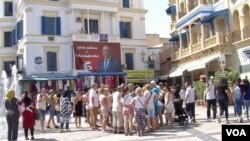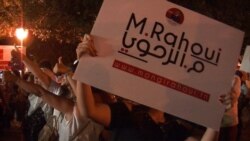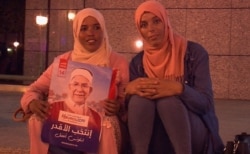Down a narrow, broken street a few blocks from this city’s tourist center, Youssouf bin Mabrouk poked his head out of the small kiosk where he sells snacks and cigarettes.
“Ben Ali for president of Tunisia,” he declared of the country’s former dictator, ousted in 2011. “He’s a good man — better than all the rest of them.”
Bin Mabrouk was more than half-serious. As Tunisians cast their ballot Sunday in their second-only democratic presidential election, disaffection is running high. The stagnating economy and soaring joblessness are just two reminders that their Jasmin Revolution eight years ago -- which helped trigger the wider Arab Spring revolt -- has failed to deliver on its promise.
“I don’t know who to vote for, they’re all the same,” 57-year-old Alia Sitou said of the raft of candidates to choose from. “All of them say they want to create employment and do good things for young people, but we see nothing. The cafes are full with young men with no jobs.”
Big Challenges
No less than 26 presidential contenders, including two women, are on the ballot in this first round of voting. But while the sheer number and political choice offer one marker of democratic strides, the election also underscores the steep challenges Tunisia faces going forward.
To be sure, tourism that dried up after the country’s 2015 terrorist attacks has bounced back. But Tunisia remains mired in an economic crisis, and youth unemployment tops 30 percent in some areas.
“This round is very important for the future,” said Hamadi Redissi, political analyst and president of the Tunisian Observatory for Democratic Transition. “Not only the future of the race, but also the future of Tunisia.”
Sunday’s vote -- moved forward with the July death of Tunisia’s 92-year-old President Beji Caid Essebsi -- kicks off a lengthy campaign season in this North African country. Legislative elections follow in October, along with a likely second round of presidential voting.
The candidates, whose posters blanket the country, identify them by both name and number on the ballot. They are a smorgasbord of political affiliations and experience, from far-left secularists to staunch Islamists, political neophytes to veteran politicians.
A dizzying choice
Final rallies Friday evening along the city’s iconic Habib Bourguiba Avenue reflected the dizzying choice. On one section, jubilant supporters of the moderate Islamist Ennahda party danced to pumping music. Political rivals held similar boisterous gatherings farther down the street. Families wandered from one event to the other, clutching small Tunisian flags.
Hours before casting his ballot, university student Fellah Ferchichi was still mulling over a short list of personal favorites that included current Prime Minister Youssef Chahed.
“He’s done a good job,” Ferchichi said.
Down the street, 25-year-old statistician Mouna Belaid threw her support behind one of the two female candidates, Abir Moussi, an unapologetic supporter of former President Ben Ali.
“She has great confidence and a good program,” Belaid said. “And it would be interesting to see a woman president in Tunisia for the first time.”
Backlash against establishment politics
Despite disenchantment heard from some on the streets, analyst Redissi noted a surge in voter registration for the elections, especially among youth -- even as he predicted a backlash against establishment politics.
“Probably the Islamists will be discredited in this elections,” Redissi said of Ennahda, part Tunisia’s governing structure since the revolution, “They will get less attention and less votes than they expected.”
At Ennahda’s campaign headquarters, where a video replayed images of its septuagenarian presidential candidate Abdelfattah Mourou, deputy scientific research minister Khalil Amiri acknowledged the public anger. But, he added, building a democratic base takes time.
“We are very conscious time is running out and patience is running out,” Amiri added, outlining the party’s priorities of regional development and job creation.
“For these kinds of deep reforms, you need a big mandate from the people,” Amiri said.
But much of voter excitement seems instead directed at political outsiders, starting with media tycoon Nabil Karoui, whose recent imprisonment on corruption allegations might have instead boosted his support.
“I’m voting for him to save him from prison,” Sihem Mzougui, 55, said. “It’s important to do a noble act.”
At Karoui’s headquarters, plastered with posters of poor people his charity helps, business owner and campaign volunteer Samy Achour is confident of winning.
“There’s no doubt in our minds,” Achour said. “We’re way ahead in the polls.”
Karoui supporters claim the businessman’s detention is politically motivated. His opponents accuse him of unfairly using his Nessma TV for publicity.
Achour is convinced his candidate is the man Tunisia needs.
“Mr. Karoui wants to break the establishment of the old bureaucracy and he wants to come up with a new administration, a new government, which is lighter and easier to deal with,” he said. "He wants to turn Tunisia into business-ready.”











